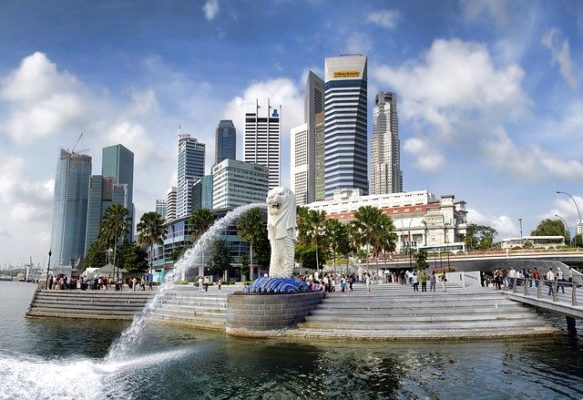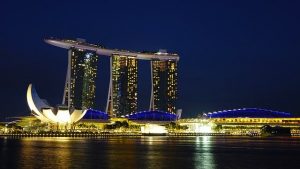Moving to another country is a big step. You will have to learn about the local culture and customs, find accommodation, enroll your children in school and arrange medical insurance. However, Singapore is one of the world’s most popular destinations for expats. It has a stable government, a low crime rate, and excellent medical facilities.
Singaporeans are also known for being polite and helpful toward visitors. Expats can usually find English-speaking jobs here, but some qualifications might be needed if you’re going into management or finance roles. There are many excellent schools here too—but they can be expensive! So, make sure you plan while still at home so that when your family arrives in Singapore, they can start off on the right foot financially.
1. Singapore is one of the most popular places for expatriates to live.
- Singapore is an island city-state with a population of 5.4 million on its relatively small landmass.
- The vast majority of Singaporeans are Chinese, but it is also home to Malays and Indians who were attracted to the city by opportunities in trade and commerce.
- It’s one of the most multicultural societies in the world today, with expats from all over Europe and North America making their way here for work, retirement, or closer to family members who’ve moved previously (or both).
- It’s safe: crime rates are low throughout this city; you’ll find locals walking around at 2 am without any safety concerns. You can even leave your bag unattended on a park bench without worrying that someone will snatch it away!
- Singaporean society is generally conservative regarding domestic issues such as divorce rates or homosexuality—but they’re quite open-minded regarding international affairs (as evidenced by their strong links with other countries through trade agreements).
2. It is English-speaking, with a low crime rate, good medical facilities, and high living standards.
Singapore is a very safe place for expats to live. The country’s low crime rate, excellent medical facilities, and high living standards make it an ideal place for expats to relocate their families. Many expats have made Singapore their home and have found it easy to communicate in English because most people there speak the language fluently.
3. It has many excellent schools, but they can be expensive.
Education is a big expense for expats in Singapore, as it is anywhere. In the US, it’s common to spend around $25,000 a year on a public school and $40,000 or more at private institutions. So, if you want to send your child to high school in the US without taking out student loans or working multiple jobs, paying up to five figures annually is not uncommon.
In Singapore, however—where many expat families will have already moved from another country before arriving here—it may be difficult for them to find schools that charge less than $15,000 per semester (or about $30K per year). This can pose an enormous financial burden on families with children who need international schooling because they’ve been educated in different countries or are bilingual English speakers from another part of Asia, like Hong Kong or Malaysia.
4. Find accommodation
The first step is to decide if you want to rent or buy a house here. If you are looking for long-term accommodation, buying property will be more practical as rent prices keep rising yearly while interest rates remain low on mortgages.
You will have to find accommodation for yourself and your family. You may rent or buy a place to live; each has its advantages and disadvantages.
When renting, it is important to consider the following:
- What is the rental market like in your neighborhood? If there are lots of apartments available, you should shop around for the best deal before signing on anything. However, suppose most leases are already taken up by expats or Singaporeans who plan on staying put for several years. That might indicate that this area is popular with expats because they know it well and can easily find jobs there.
- How much space do you need? Most people want an apartment with at least two bedrooms so their children can have their rooms (and maybe even some privacy). It’s also good if each room has its bathroom so that guests don’t need to share facilities as often when visiting your home – especially since bathrooms usually aren’t very large! But if affordability is important for you, then one-bedroom flats might work out better than larger places since they’re cheaper per square meter than three-bedroom ones or larger apartments would be.”
5. Buying Property
Singapore properties are a top choice for investment property worldwide for good country governance and high living standards. Singapore new launch condo, which is a private condominium, is a top choice for foreigners and expats living in Singapore. However, before you can buy property in Singapore, it’s important to understand the process here. There are some restrictions on foreigners buying property in Singapore, which you may like to read more about to check which properties you are eligible to purchase.
Singapore has plenty to offer for both foreigners and locals alike. If you’re looking for an investment opportunity and a place to live all in one, then investing in Singapore is worth considering.
6. Singapore is ethnically diverse, with people from all over the world.
Singapore is a melting pot of cultures. In addition to the Chinese majority, there are Malays and Indians who make up significant portions of the population. Expats may be surprised at how many expats there are in Singapore, but this makes sense, considering how many companies have regional headquarters here.
Many expats come to Singapore for work and then stay because of its excellent quality of life.
7. Singapore has many great things going for it, but it’s not perfect.
Singapore is a very interesting place with many great things going for it. It has a low crime rate, good medical facilities, high living standards, and excellent infrastructure. However, it’s not perfect – there are some downsides to living in Singapore that expats should be aware of before moving here.
The most obvious downside is the cost of living in Singapore as an expat. The country has an extremely high cost of living compared to most other countries in Southeast Asia, meaning that your salary will go further elsewhere in the region if you’re on a budget. The second downside is the climate—it’s hot and humid all year round (and often rainy during monsoon season), which can make it difficult for people who aren’t used to such weather conditions.
Conclusion
If you’re considering moving to Singapore, we hope this article has given you some insight into the pros and cons of the country. It is one of the most popular places for expatriates to live, with many excellent schools, but they can be expensive. Housing is also costly, so plan while you are still at home. Singapore is a very ethnically diverse country, with people from all over the world.




